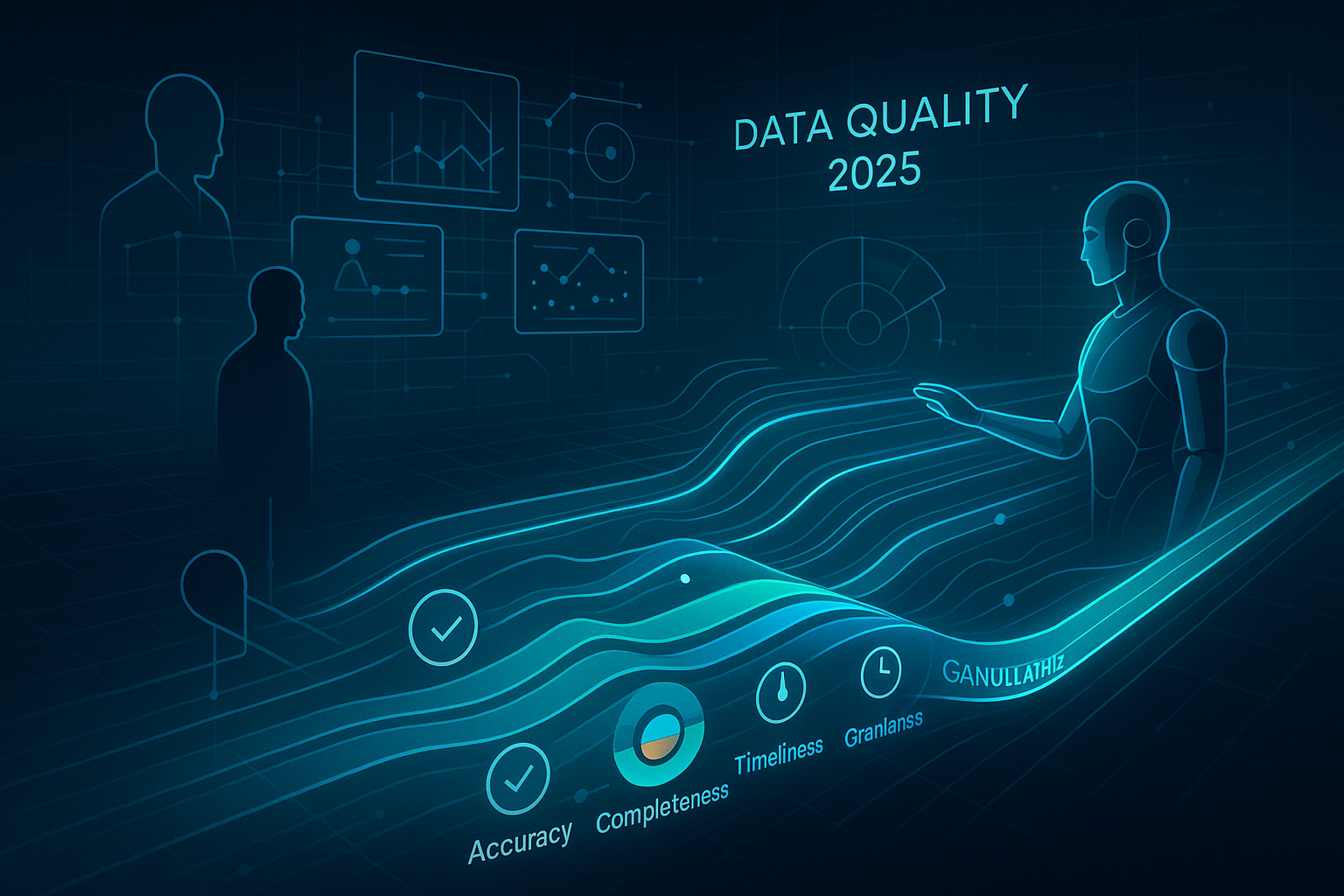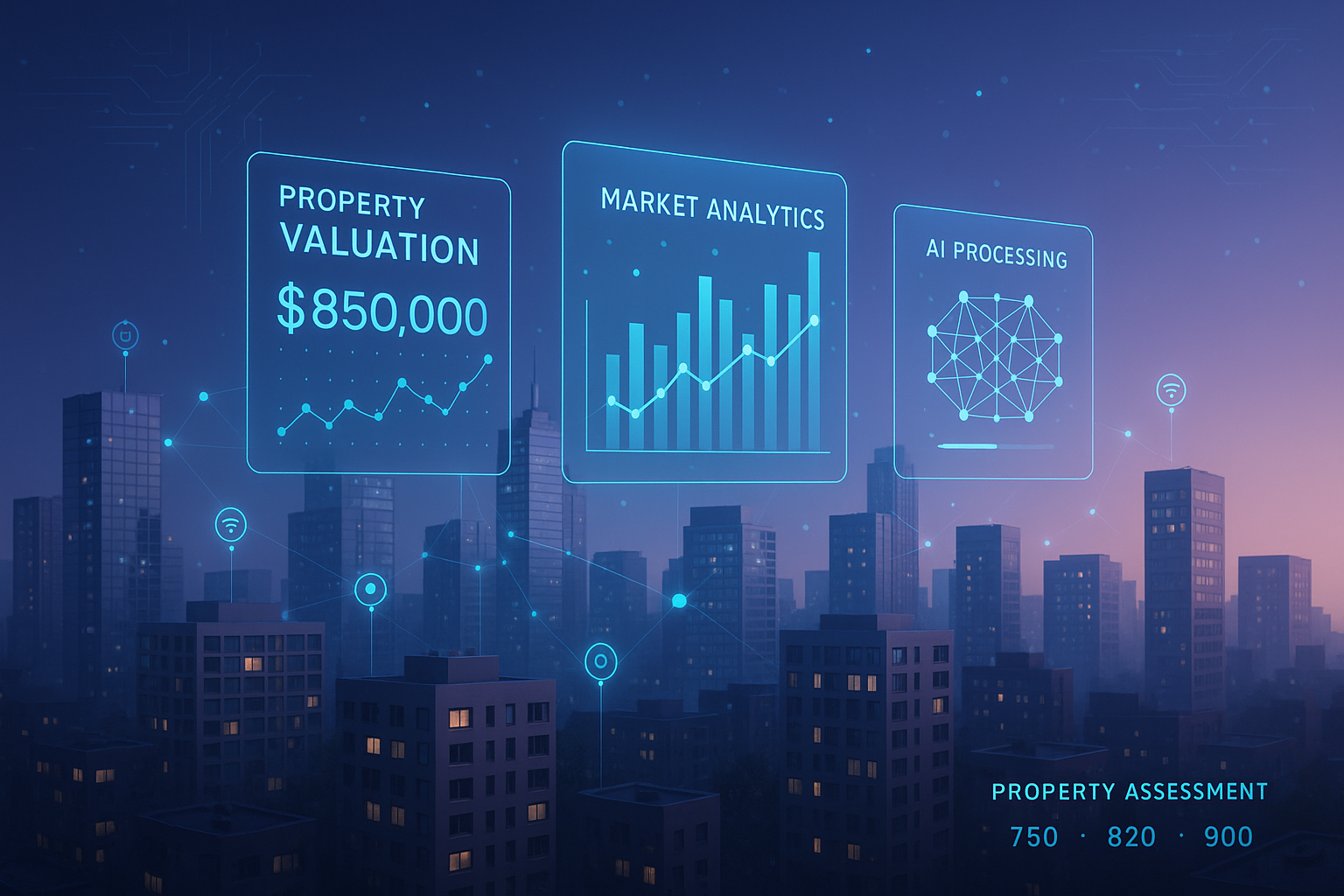
Fundamental Data Quality Principles for High-Performance AI Agent Development (2025 Guide)
Caiyman.ai Research Team
AI Solutions Architect
In 2025, data quality has become the single most critical driver of successful, scalable, and trustworthy AI agent deployments. As organizations race to unlock new value from AI, the caliber of their underlying data is now the defining factor behind market-leading innovation, regulatory compliance, and ethical stewardship.
High-quality data, within modern AI systems, means more than accuracy—it is a multidimensional foundation encompassing completeness, timeliness, granularity, and a proactive approach to governance and transparency. In the face of growing complexity, regulatory imperatives, and public scrutiny, robust data quality management is non-negotiable. In this guide, we’ll break down the essential principles, actionable strategies, key industry challenges, and emerging innovations that will define enterprise AI success in 2025 and beyond.
Fundamental Data Quality Principles for AI Agent Development
At the core of every effective AI agent lies a disciplined approach to data quality. Four critical attributes—accuracy, completeness, timeliness, and granularity—form the building blocks of reliable, high-impact AI outcomes (FRA, 2019).
Accuracy: The Cornerstone of Trustworthy AI
Accuracy refers to the extent to which data correctly reflects the actual, real-world phenomena it represents. For AI, high accuracy ensures models learn genuine patterns, generate valid decisions, and foster user trust. In industries like healthcare or finance, inaccurate data can lead to severe misdiagnosis, fraud, or regulatory breaches. NIST emphasizes robust validation strategies—such as regular audit sampling, anomaly detection, and construct validity testing—to catch and prevent data inaccuracies before they corrupt AI learning.
Completeness: Avoiding Gaps and Biases in AI Learning
Completeness is about having all necessary and relevant data points available, free of missing values or gaps. Incomplete datasets bias models, limit generalizability, and undermine fairness (for example, underrepresented groups in loan applications). Best practices call for rigorous audits, imputation strategies for missing values, and multi-source enrichment—ensuring AI agents develop robust, equitable insights (Shelf.io).
Timeliness: Keeping AI Decisions Relevant and Responsive
Timeliness ensures that data is up-to-date and contextually relevant, enabling AI agents to respond dynamically to real-world changes. Outdated data leads to concept drift and potential strategic failures, particularly in volatile sectors like finance or logistics. Organizations should implement real-time ingestion pipelines, periodic data refresh cycles, and automated monitoring of data staleness (Alation, 2025).
Granularity: Achieving Precision Without Overcomplexity
Granularity refers to the level of detail encoded in data records. Proper granularity allows AI agents to spot nuanced patterns and drive precision in outcomes. Too coarse data may hide critical insights; overly granular data introduces noise and complexity. Equilibrium is found by aligning data resolution to the specific use case, leveraging feature engineering and dimensionality reduction where appropriate.
Best Practices and Governance Strategies for Ensuring AI Data Quality
To transform the above principles into operational excellence, organizations must adopt holistic frameworks grounded in governance, automation, continuous validation, and ethical rigor:
Robust Data Governance and Compliance
Modern enterprises establish clear policies and stewardship roles—such as Chief Data & Analytics Officers (CDAOs) and compliance teams—to manage the entire data lifecycle. Automated, federated governance infrastructures ensure privacy (GDPR, CCPA), security, and accountability, all while supporting innovation (Kanerika; AIMultiple).
Automated Data Cleansing and Enrichment
Data cleansing—removing duplicates, correcting errors, and handling outliers—is now highly automated, leveraging AI/ML to maintain data fitness at scale. Organizations should complement automation with manual review for edge cases and deploy continuous monitoring dashboards to catch degradation early (Alation).
Integrating Diverse Data Modalities and Sources
Combining structured and unstructured data from multiple sources (e.g., text, images, sensors) enriches insights and minimizes single-source bias. Hybrid AI architectures, supported by robust ETL processes, offer both greater learning depth and operational resilience.
Continuous Validation and Real-World Model Testing
Best-in-class AI initiatives employ systematic validation—using cross-validation, holdout sets, and real-world pilots—plus ongoing performance monitoring to detect drift and deliver consistent results (Alation – Best Practices).
Embedding Ethical and Transparent AI Principles
Data quality and AI ethics are increasingly inseparable; fairness, accountability, and transparency must be embedded from the start. Continuous bias detection, stakeholder feedback, and thorough documentation/audit trails are essential in regulated sectors (NIST SP 1270).
Emerging Trends and Tools for Data Quality Monitoring in AI Agents (2025)
The data quality technology landscape is evolving rapidly. In 2025, several innovations stand out:
AI Transparency and Explainability Frameworks
Transparency frameworks make AI agent decisions auditable and explainable—addressing regulatory mandates, building stakeholder trust, and improving error tracing. Solutions highlighted by Rapid Innovation are now mainstream in compliance-driven sectors, enabling real-time review of AI operations and outputs.
Automated Real-Time Monitoring and Alerts
Modern data quality tools enable no-code/low-code rule setup and event-based quality alerts, automating problem detection and resolution. Integration of such tools within data pipelines ensures that quality issues are addressed before they can affect AI outcomes (Alation, 2025).
Advanced Bias Detection and Fairness Assurance
Cutting-edge platforms provide integrated bias analytics and mitigation—before and after AI deployment. According to NIST, these functionalities are not just ethical necessities but operational requirements for mission-critical domains like healthcare or public policy.
Sectoral Case Studies: Data Quality Driving Real AI Outcomes
Real Estate: Accelerated Sales and Efficiency Gains
Case studies reveal that high-quality, integrated data enables developers to sell projects up to 40% faster and achieve 12% price premiums. Predictive AI models leveraging timely, granular data yield 3-5% higher sales prices and boost rental yields by 8% annually, while AI-powered property management systems cut emergency maintenance costs by up to 40% (Shelf.io).
Finance: Fairness and Performance in Automated Decisioning
Financial institutions using complete, accurate credit and transaction data report improved loan approval fairness and significant reductions in discriminatory bias. “Quant Agents” leveraging rich, current financial feeds deliver better prediction accuracy and regulatory compliance (FRA, 2019).
AI-Driven Content and Scenario Modelling
Generative AI platforms use curated datasets to automate content creation while maintaining accuracy and compliance. High completeness and granularity enhance scenario modeling and risk analysis quality, translating to improved decision support for real estate and investment professionals.
Challenges and Opportunities in Enterprise Data Quality for AI Agents
Despite major advances, enterprises still face critical obstacles: fragmented/siloed data, scale and heterogeneity challenges, ongoing risk of historical bias, and constantly shifting regulatory/ethical expectations. However, the opportunities are greater than ever—new standards, federated governance models, and collaborative best practices are setting a rising bar for quality and compliance (Kanerika; Shelf.io). Enterprises moving proactively are poised for outsized innovation, trust, and return on investment.
Raising the Bar: Why Data Quality is a Strategic Imperative for AI Success in 2025 and Beyond
AI leaders who embed rigorous data quality management position their organizations at the forefront of trustworthy, cost-effective, and impact-driven AI. By synthesizing advanced technology, robust governance, and a culture of ethical improvement, enterprises are set to capture new business value while minimizing risk. Prioritize data quality, invest in continuous improvement, and lead the future of responsible AI.
Partner with Caiyman.ai for High-Impact, Responsible AI Solutions
Caiyman.ai specializes in AI agent development, integration, and comprehensive data quality management for enterprises across industries. Our expert consultants can tailor governance frameworks, automate cleansing/monitoring, and embed transparency-first principles into your AI stack for sustained value and compliance. Contact us to accelerate responsible, high-performance AI transformation.
Sources
- Data Quality Management for AI Success: Your 2025 Guide – Alation (accessed 2025-05-13)
- Data Governance Trends 2025: Key Insights for Businesses – Kanerika (accessed 2025-05-13)
- AI Data Governance for Ethical Use in 2025 – AIMultiple (accessed 2025-05-13)
- AI Transparency Agents 2025 – Rapid Innovation (accessed 2025-05-13)
- Data Quality and Artificial Intelligence: Mitigating Bias and Error – FRA (accessed 2025-05-13)
- The Critical Role of Data Quality in AI Implementations – Shelf.io (accessed 2025-05-13)
- AI Governance Best Practices: A Framework for Data Leaders – Alation (accessed 2025-05-13)
- Towards a Standard for Identifying and Managing Bias in Artificial Intelligence – NIST SP 1270 (accessed 2025-05-13)
Share this article
Related Articles

How AI is Transforming Real Estate in 2025: From Domain-Specific LLMs to Automated Valuations
Discover how AI innovations like Real-GPT, advanced AVMs, and computer vision are revolutionizing property valuation, achieving 95% accuracy while reducing costs by 30% and transforming decision-making across the real estate industry.

How AI Is Transforming Property Valuation: 2025 AVM Market Analysis and Predictions
The AI revolution in real estate is accelerating with automated valuation models reaching 99% accuracy and a market projected to hit $303.06 billion in 2025.

AI Revolution in Mortgages: Fannie Mae's Game-Changing Fraud Detection & Blockchain Tokenization
Discover how Fannie Mae's groundbreaking AI partnership with Palantir is revolutionizing mortgage fraud detection from months to seconds, while blockchain tokenization transforms real estate investment accessibility.